Touting ‘full and formal peace’ with advanced, innovative Gulf nation, PM notes Israelis will soon be flying direct to Abu Dhabi; insists annexation plan is only temporarily halted
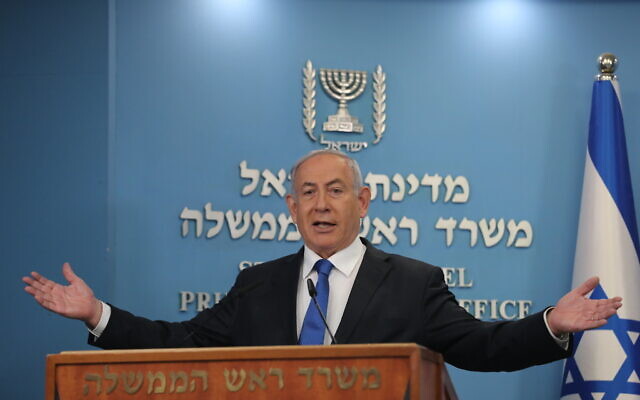
Announcing details of the historic agreement for full diplomatic relations between Israel and the United Arab Emirates, Prime Minister Benjamin Netanyahu on Thursday night hailed what he called a “new era of Israeli relations with the Arab world,” and said other deals with Arab countries would follow.
He also insisted that he would continue to seek to extend Israeli sovereignty to parts of the West Bank land, in coordination with the US, but acknowledged that his plan for unilateral annexation was being temporarily halted, in line with the joint statement issued by the US, Israel and the UAE which specified that Israel would “suspend” the move.
In a televised address delivered hours after US President Donald Trump announced the breakthrough on Twitter, Netanyahu said that the UAE, Israel and the US had agreed on “a full and formal peace” in a phone call Thursday.
According to Netanyahu, there will be a “full” exchange of embassies, ambassadors, economic exchanges, direct flights and more. “Together, with our joint strengths, we can bring a great future for our peoples and our region,” he added, saying the countries would share their advanced technological knowledge for mutual benefit.
“This is very important for our economy, the regional economy and our future,” the prime minister said.
He said the UAE would make investments that would boost the Israeli economy, and that the two countries would work together on a vaccine for COVID-19.
He hailed the UAE as a rising world power, like Israel, and one that had made the desert bloom, like Israel, noting its skyscrapers, artificial islands, space program and culture of innovation.
He also said the agreement reflected the “dramatic change” in the way Israel was perceived in the region. In the past, it was regarded “as an enemy and source of instability” but today “many, many states see Israel as a strategic ally for stability, for security, for advancement and also for peace.
“There will be other Arab and Muslim states that will join the circle of peace with us,” he predicted. Israel and moderate states in the region “stand aligned in favor of advancement and against the extremist forces that threaten us and world peace.”
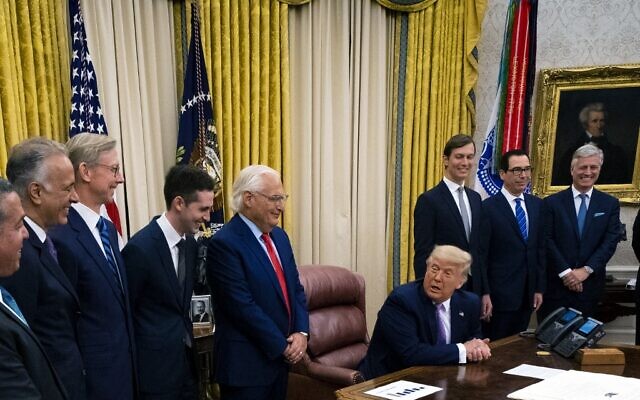
Netanyahu also hailed Trump, “one of Israel’s greatest friends,” for enabling the deal, said advancing genuine, sustainable peace was Israel’s defining mission, and expressed confidence that all Israeli citizens would welcome the accord.
Placing himself as the latest in the short line of Israeli prime ministers to sign historic peace deals with Arab states, following Menachem Begin with Egypt (1979) and Yitzhak Rabin with Jordan (1994), Netanyahu said it was an “honor…after years of my making efforts, dreaming of it, working toward it… to establish the third peace agreement between Israel and an Arab state, the United Arab Emirates.”
Earlier Thursday afternoon, a White House announcement said the leaders of the US, Israel and the UAE “spoke today and agreed to the full normalization of relations between Israel and the United Arab Emirates.”
Israeli and UAE delegations will meet in the coming weeks to sign bilateral agreements regarding investment, tourism, direct flights, security and the establishment of reciprocal embassies, it said.
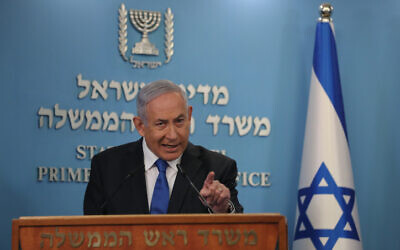
Announcing the deal, Trump wrote on Twitter: “HUGE breakthrough today. Historic Peace Agreement between our two GREAT friends, Israel and the United Arab Emirates!”
Netanyahu said he has been working toward the goal of normalization with the Gulf since 2009.
“I always thought it was possible… I have been doing this constantly, for years,” he said, noting his contacts with Oman, Sudan and other states in the area that don’t have official ties with Israel.
Netanyahu asserted he had proven wrong those who said it would be impossible to forge peace with an Arab country without reaching an accord with the Palestinians first and without withdrawing to the pre-1967 lines.
“I say to the residents of the United Arab Emirates: Salam Alaikum. Shalom Aleichem. Peace be to you, and us,” Netanyahu concluded his prepared remarks.
Later answering questions, Netanyahu insisted that that the agreement was not made in exchange for anything, and said there is “no change in my plans for annexation, [in] full coordination with the US.”
Netanyahu claimed that Trump had only requested a “temporary” suspension of annexation plans and that “temporary means temporary.” He said he was committed to sovereignty, and will “never give up on our rights in our land.
“Just as I brought peace, I will bring sovereignty [to the West Bank],” he vowed, adding “I did not take sovereignty off the table.” He went on: “Nobody ever believes my promises” but “I always prove them wrong.”
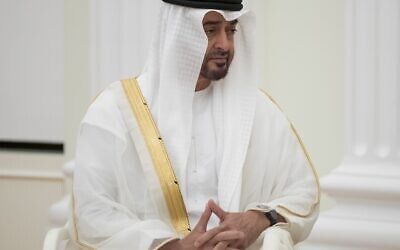
The joint statement issued by the White House states that “Israel will suspend declaring sovereignty over areas outlined in the President’s Vision for Peace and focus its efforts now on expanding ties with other countries in the Arab and Muslim world. The United States, Israel, and the United Arab Emirates are confident that additional diplomatic breakthroughs with other nations are possible, and will work together to achieve this goal.”
Asked if he supports a two state solution, Netanyahu said he was committed to the Trump peace plan, calling it the most realistic plan since 1967, while at the same time refusing to define what a Palestinian entity would be.
In response to his comments, a senior UAE official told The Times of Israel that Abu Dhabi remained committed to the establishment of a Palestinian state and the terms of the Arab Peace Initiative.
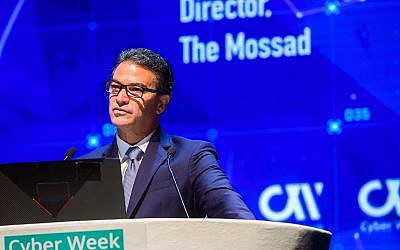
“The UAE, US and Israel have agreed on suspending Israeli annexation of Palestinian territories in order to establish bilateral relations towards a stable and peaceful region via dialogue and diplomacy,” Hend al-Otaiba, the director of strategic communications of the Emirati Foreign Ministry, stressed.
Later Thursday, Netanyahu called Mossad Director Yossi Cohen and thanked him for the agency’s assistance in “developing the ties with the Gulf states over the years, which assisted in bringing the [UAE] peace treaty to fruition.”
Speaking to reporters after his own announcement, Trump suggested that more diplomatic breakthroughs between Israel and its Muslim neighbors in the region were expected.
“Things are happening that I can’t talk about,” the US president said.
As reported by The Times of Israel
